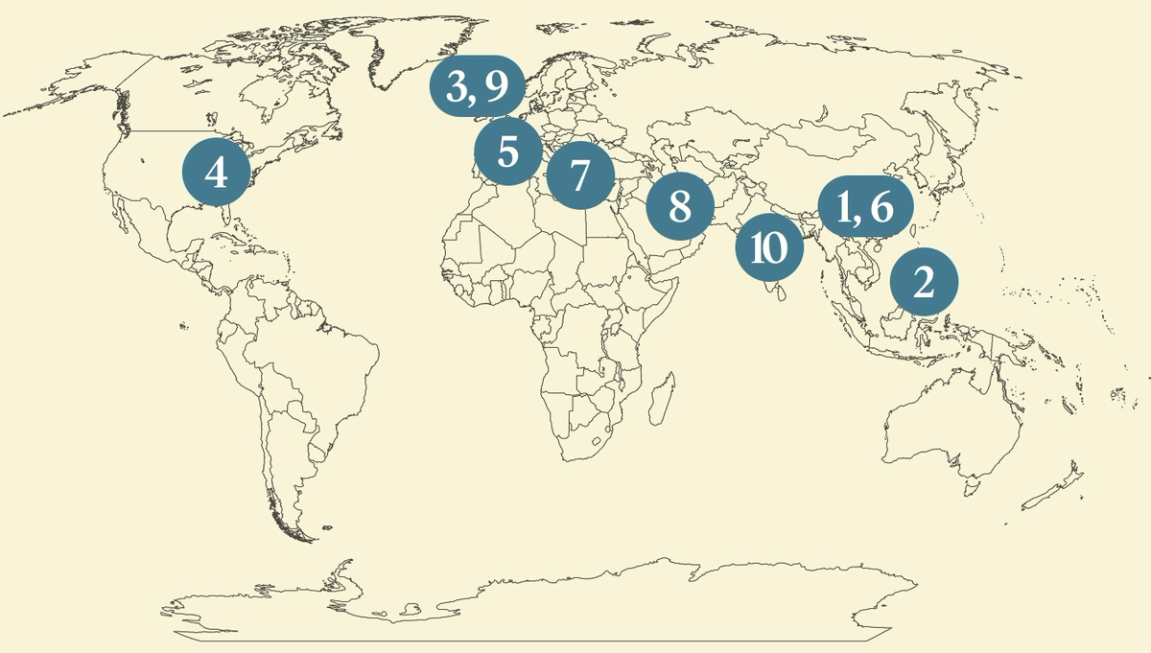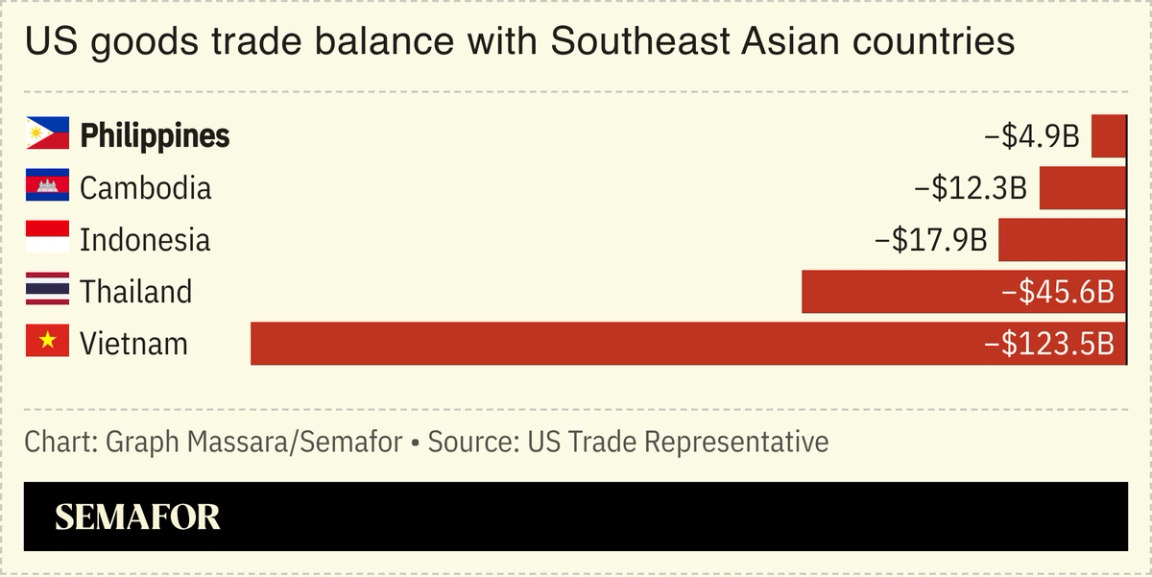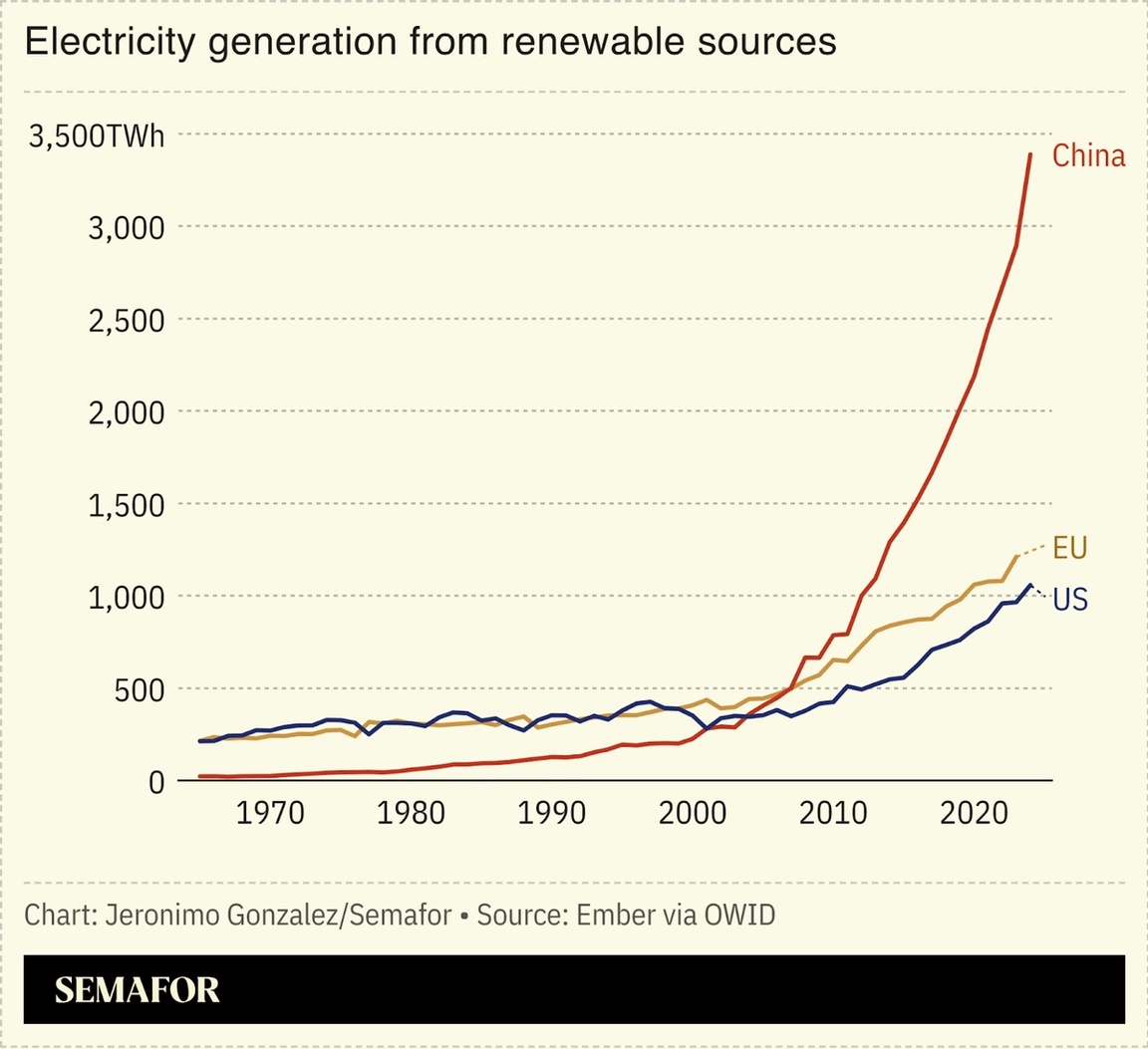| | Donald Trump announces a Philippines trade deal, Greece wants émigrés to return, and Ozzy Osbourne d͏ ͏ ͏ ͏ ͏ ͏ |
| |  | Flagship |  |
| |
|
The World Today |  - Trump touts Xi invite
- US-Philippines trade deal
- AstraZeneca’s funding pledge
- Stargate struggles
- US leaves UNESCO again
- China clean tech impact
- Greece lures back émigrés
- Iran leaders stir nationalism
- Prince of Darkness dies
- India’s exclusive hangouts
 An exhibition spotlights an English filmmaker’s Black Paintings. |
|
 Kent Nishimura/Reuters Kent Nishimura/ReutersUS President Donald Trump suggested Tuesday that he might visit China in the “not-too-distant future” following an invite from Xi Jinping, as the superpowers gear up for fresh trade talks. Washington has softened its approach to China in recent weeks: The US Treasury secretary said negotiations in Stockholm next week will likely be aimed at extending a US-China trade truce beyond Aug. 12. Trump has adopted a more conciliatory tone toward Beijing to secure a trade deal and an in-person summit with Xi, which analysts predict could take place during the APEC summit in South Korea this fall. Trump’s toned-down approach, though, has rankled some China hawks in Washington. |
|
Trump announces Philippines trade deal |
 US President Donald Trump on Tuesday announced a trade deal with the Philippines after a White House meeting with the country’s leader, Ferdinand Marcos Jr. Under the agreement, which Manila hasn’t confirmed, American goods shipped to the Philippines won’t face any duties, while Philippine exports to the US will see a 19% tariff. That figure is in line with rates other Southeast Asian nations are set to face. Such deals mark short-term wins for US negotiators, but risk undermining the region’s competitiveness and sovereignty, turning its relationship with Washington into “a rent-seeking system rather than a strategic partnership,” a Stimson Center expert argued. That dynamic could accelerate what many in the West fear: a Southeast Asian pivot toward China. |
|
Tariff threat weighs on pharma industry |
 AstraZeneca CEO Pascal Soriot and Virginia Gov. Glenn Youngkin. Umit Bektas/Reuters AstraZeneca CEO Pascal Soriot and Virginia Gov. Glenn Youngkin. Umit Bektas/ReutersBritish-Swedish pharmaceutical giant AstraZeneca vowed to invest $50 billion in the US by 2030, joining other drugmakers looking to avoid President Donald Trump’s punishing tariffs. Trump has floated a 200% duty on imported drugs, pushing for more domestic production. Swiss firms Roche and Novartis have also pledged new US investments. The moves reflect how the trade war has continued to weigh on companies: Some large tech firms are also making funding announcements to fend off attacks, while other sectors are grappling with shrinking profit margins. General Motors said Tuesday that its second-quarter earnings took a $1.1 billion hit because of existing duties, after Stellantis said tariffs had cost the automaker $350 million. |
|
Stargate off to slow start |
 Daniel Cole/Reuters Daniel Cole/ReutersA massive US venture aimed at building data centers and scaling up the country’s artificial intelligence ambitions is reportedly off to a slow start. The $500 billion Stargate project, unveiled by President Donald Trump at the White House in January, hasn’t completed a single deal for a data center, The Wall Street Journal reported, with joint leaders OpenAI and SoftBank at odds over critical details. Stargate is now setting a less ambitious goal of one small facility by the end of the year. Still, the appetite for computing power to support the AI boom isn’t fading yet: OpenAI on Tuesday announced a deal with Oracle to build data centers with 4.5 gigawatts of capacity, enough to power 4 million homes. |
|
US pulls out of UNESCO, again |
 Abdul Saboor/Reuters Abdul Saboor/ReutersThe US announced Tuesday that it would withdraw from the United Nations’ cultural and educational agency, UNESCO, the Trump administration’s latest move to distance itself from international institutions. A White House spokesperson attributed the decision to the agency’s “woke, divisive cultural and social causes,” while UNESCO’s head said the move came as no surprise: Donald Trump also pulled Washington’s participation during his first term, and he has rejected other multinational bodies, including the World Health Organization, the UN Human Rights Council, and a global climate accord. The UNESCO withdrawal could hand a win to China, which has moved to capitalize on Trump’s disdain for multilateralism by expanding its influence within the UN, Western diplomats told the Financial Times. |
|
Chinese clean tech’s global impact |
 China’s booming clean energy industry is making a major dent in emissions outside the country’s borders. The solar panels, wind turbines, and EV batteries exported by China in 2024 shaved 1% off the world’s carbon footprint, according to a new analysis by Carbon Brief. China maintains a global lead in clean tech manufacturing, which is increasingly foundational to its economy; in 2024, it contributed more than 10% of the country’s GDP. Beijing’s exports also unlock growth in other countries, given the economic value of operating renewable energy projects, Semafor’s climate and energy editor wrote. And while the West is putting up trade barriers for Chinese clean tech, “the Middle East, South Asia, and Africa are throwing open their doors.” |
|
Greece wants diaspora to return |
 Greek businesses and government officials are touring Europe with the aim of convincing émigrés to return to the homeland now that its economy has turned around. More than 600,000 of the country’s now-10 million residents, most of them young and highly educated, left Greece between 2009 and 2021, when the country suffered the worst recession of any peacetime developed economy ever. But it has seen a remarkable economic turnaround: Since 2020, Greece has grown faster than France and Germany, and Athens wants to tell its diaspora that the country is not how they remember it. Europe’s periphery has outperformed its core for several years, with Spain, Italy, and Portugal all doing better than the eurozone’s big players. |
|
 From startup unicorns to Fortune 500 boardrooms, The Hustle is your daily window into the business and tech moves that matter most. With breezy, insider-minded reporting that keeps you sharp in just 5 minutes, The Hustle delivers the essential intel that 2M+ professionals use to gain their edge. Subscribe for free. |
|
Iran’s leaders channel nationalism |
 Majid Asgaripour/WANA via Reuters Majid Asgaripour/WANA via ReutersIran’s hardliners and reformists are locked in a power struggle after Israel’s assault on Tehran’s military and scientific command. Reformers, including President Masoud Pezeshkian, want sweeping changes in foreign relations and domestic policy, including diplomacy with the West and new economic strategies, the Financial Times reported, an approach that has angered ideologues. Israel’s attacks left power vacuums in Tehran but also reawakened Iranian nationalism, which the country’s leaders are now trying to channel into support for the regime: The theocratic government that once shunned Iran’s pre-Islamic heritage — seen as the domain of the country’s secular nationalists — is now promoting ancient folklore and patriotic symbols to stir up public outrage, The New York Times wrote. |
|
 Ueslei Marcelino/Reuters Ueslei Marcelino/ReutersBritish rockstar Ozzy Osbourne, considered the godfather of heavy metal, died on Tuesday aged 76, his family said. The Black Sabbath frontman had reunited with his original bandmates for a final show just weeks ago. The band’s style in the 1970s defined a new style of rock and changed the genre forever through “doomsday lyrics, detuned riffs, and plodding tempos,” Consequence wrote. While at times controversial, the Prince of Darkness became a pop culture icon through his “electrifying and unpredictable onstage presence,” as well as his family’s reality TV show in the early 2000s, which became the paradigm for later celebrity-focused programs, Rolling Stone wrote: “He was an underdog everyone would want to rally behind.” |
|
Indian elites’ new hangouts |
|
|